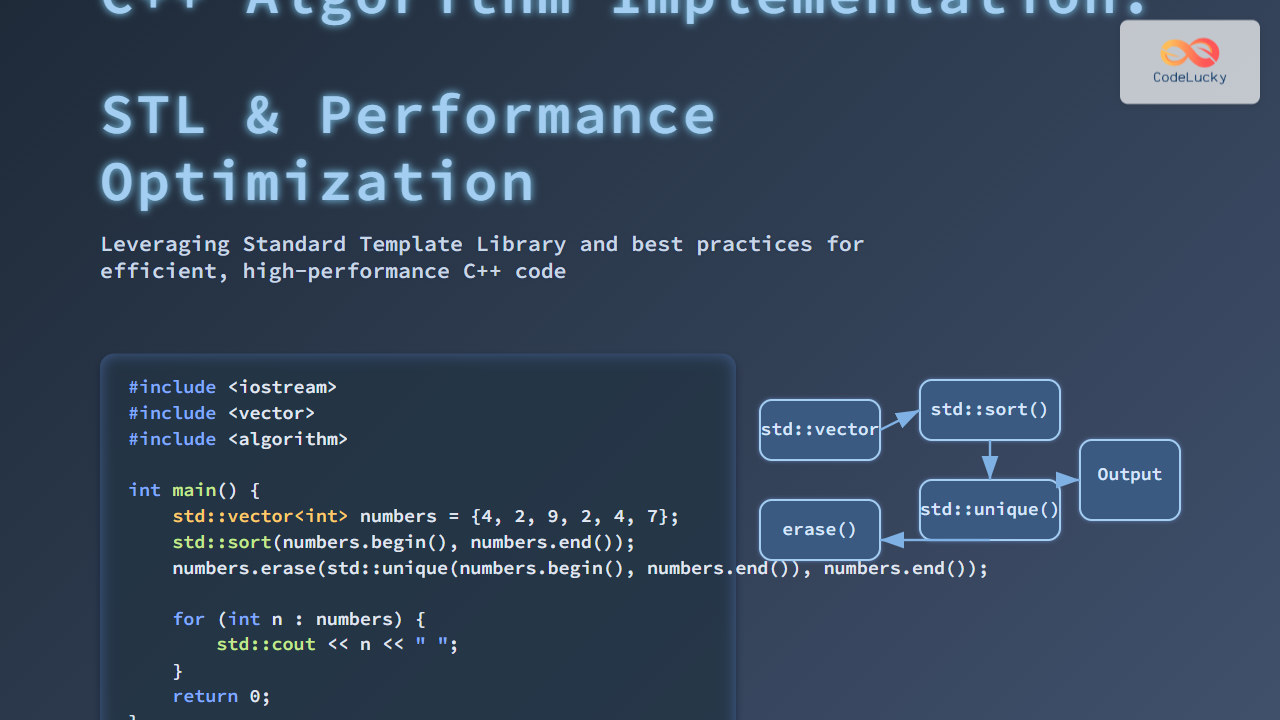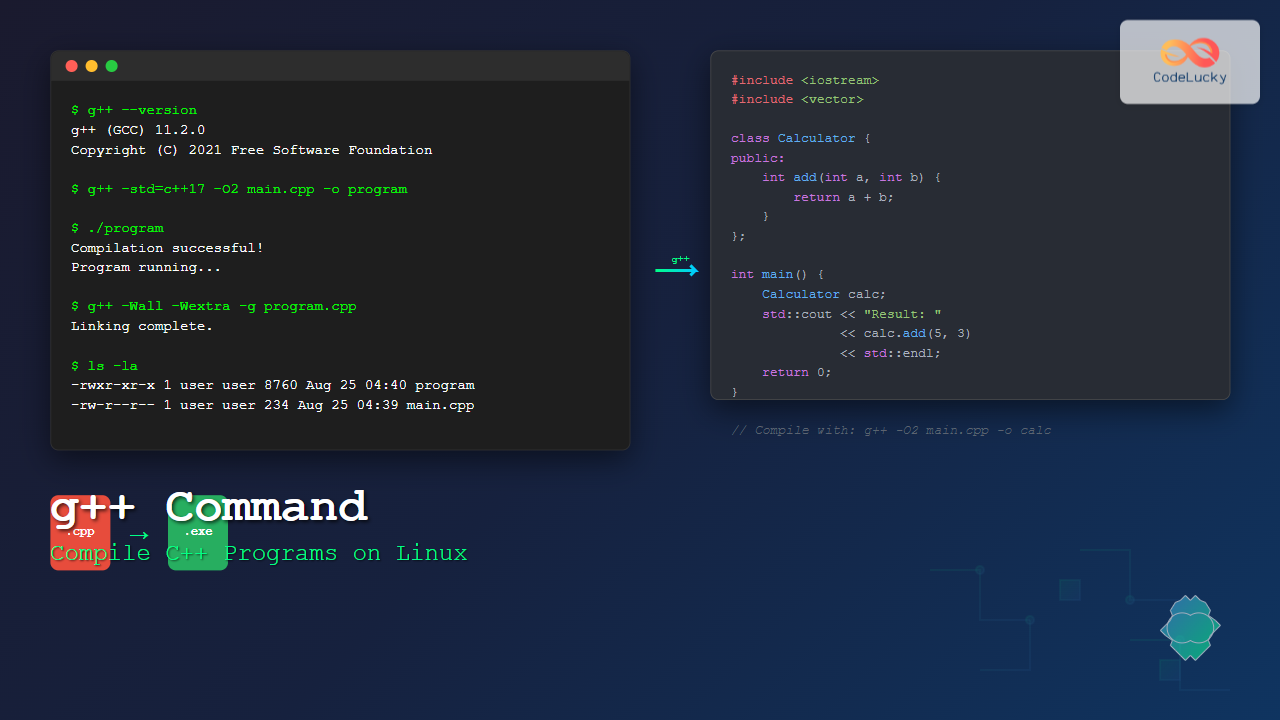C++ coroutines, introduced in C++20, represent a paradigm shift in how we approach asynchronous programming and cooperative multitasking. This powerful feature allows developers to write asynchronous code that looks and behaves like synchronous code, making it easier to reason about and maintain. In this comprehensive guide, we'll dive deep into C++ coroutines, exploring their syntax, mechanics, and real-world applications.
Understanding Coroutines
Coroutines are functions that can suspend their execution and later resume from where they left off. This ability to pause and resume makes them ideal for scenarios involving asynchronous operations, lazy evaluation, and cooperative multitasking.
🔑 Key Characteristics of Coroutines:
- Can be suspended and resumed
- Maintain their state between invocations
- Allow for cooperative multitasking without the overhead of threads
Let's start with a simple example to illustrate the basic syntax of a coroutine:
#include <coroutine>
#include <iostream>
struct SimpleCoroutine {
struct promise_type {
SimpleCoroutine get_return_object() { return {}; }
std::suspend_never initial_suspend() { return {}; }
std::suspend_never final_suspend() noexcept { return {}; }
void return_void() {}
void unhandled_exception() {}
};
};
SimpleCoroutine simple_coroutine() {
std::cout << "Start of coroutine\n";
co_await std::suspend_always{};
std::cout << "End of coroutine\n";
}
int main() {
auto coro = simple_coroutine();
std::cout << "Coroutine suspended\n";
// Resume the coroutine
coro.resume();
return 0;
}
In this example, we define a simple coroutine that prints a message, suspends itself, and then prints another message when resumed. The co_await keyword is used to suspend the coroutine.
Output:
Start of coroutine
Coroutine suspended
End of coroutine
Coroutine Mechanics
To fully grasp coroutines, we need to understand their underlying mechanics. A coroutine in C++ is built upon several key components:
- Promise Object: This object represents the coroutine's state and defines its behavior.
- Coroutine Handle: A non-owning handle that allows resuming a suspended coroutine.
- Awaitable Objects: Objects that can be used with
co_awaitto suspend the coroutine.
Let's explore each of these components in more detail.
Promise Object
The promise object is the heart of a coroutine. It defines how the coroutine should behave at key points in its lifetime. Here's a more detailed example of a promise type:
struct MyCoroutine {
struct promise_type {
MyCoroutine get_return_object() {
return MyCoroutine(std::coroutine_handle<promise_type>::from_promise(*this));
}
std::suspend_always initial_suspend() { return {}; }
std::suspend_always final_suspend() noexcept { return {}; }
void return_void() {}
void unhandled_exception() {
std::terminate();
}
};
std::coroutine_handle<promise_type> handle;
MyCoroutine(std::coroutine_handle<promise_type> h) : handle(h) {}
~MyCoroutine() {
if (handle) handle.destroy();
}
void resume() {
if (handle) handle.resume();
}
};
In this example, we define a more complete coroutine type with a promise object that allows for manual resumption and proper cleanup.
Coroutine Handle
The coroutine handle is a lightweight, non-owning handle to a coroutine. It's used to resume a suspended coroutine. Here's an example of how to use a coroutine handle:
MyCoroutine coro_function() {
std::cout << "Coroutine started\n";
co_await std::suspend_always{};
std::cout << "Coroutine resumed\n";
co_await std::suspend_always{};
std::cout << "Coroutine finished\n";
}
int main() {
MyCoroutine coro = coro_function();
std::cout << "Main function\n";
coro.resume();
std::cout << "Back in main\n";
coro.resume();
return 0;
}
Output:
Main function
Coroutine started
Back in main
Coroutine resumed
Coroutine finished
Awaitable Objects
Awaitable objects are used with the co_await keyword to suspend a coroutine. An object is awaitable if it has an await_ready, await_suspend, and await_resume function. Let's create a custom awaitable:
class CustomAwaitable {
public:
bool await_ready() const noexcept {
return false; // Always suspend
}
void await_suspend(std::coroutine_handle<> h) const noexcept {
// Schedule the coroutine to be resumed later
std::thread([h]() {
std::this_thread::sleep_for(std::chrono::seconds(1));
h.resume();
}).detach();
}
void await_resume() const noexcept {}
};
MyCoroutine custom_await_coroutine() {
std::cout << "Coroutine started\n";
co_await CustomAwaitable{};
std::cout << "Coroutine resumed after 1 second\n";
}
int main() {
auto coro = custom_await_coroutine();
coro.resume();
std::this_thread::sleep_for(std::chrono::seconds(2));
return 0;
}
This example demonstrates a custom awaitable that suspends the coroutine for one second before resuming it.
Practical Applications of Coroutines
Now that we've covered the basics, let's explore some practical applications of coroutines in C++.
1. Asynchronous I/O
Coroutines excel at handling asynchronous I/O operations. Here's an example of how coroutines can simplify asynchronous file reading:
#include <coroutine>
#include <fstream>
#include <vector>
#include <iostream>
struct AsyncReader {
struct promise_type {
std::vector<char> result;
AsyncReader get_return_object() { return AsyncReader(std::coroutine_handle<promise_type>::from_promise(*this)); }
std::suspend_never initial_suspend() { return {}; }
std::suspend_never final_suspend() noexcept { return {}; }
void return_void() {}
void unhandled_exception() { std::terminate(); }
};
std::coroutine_handle<promise_type> handle;
AsyncReader(std::coroutine_handle<promise_type> h) : handle(h) {}
~AsyncReader() { if (handle) handle.destroy(); }
std::vector<char> get_result() {
return handle.promise().result;
}
};
AsyncReader read_file_async(const std::string& filename) {
std::ifstream file(filename, std::ios::binary | std::ios::ate);
if (!file) {
co_return;
}
std::streamsize size = file.tellg();
file.seekg(0, std::ios::beg);
std::vector<char> buffer(size);
if (file.read(buffer.data(), size)) {
co_await std::suspend_always{};
co_yield buffer;
}
}
int main() {
auto reader = read_file_async("example.txt");
std::cout << "File reading initiated\n";
// Simulate some other work
std::this_thread::sleep_for(std::chrono::seconds(1));
auto content = reader.get_result();
std::cout << "File content size: " << content.size() << " bytes\n";
return 0;
}
This example demonstrates how coroutines can be used to perform asynchronous file I/O, allowing the main thread to continue execution while the file is being read.
2. Generator Functions
Coroutines are perfect for implementing generator functions, which can produce a sequence of values over time. Here's an example of a Fibonacci sequence generator:
#include <coroutine>
#include <iostream>
struct Generator {
struct promise_type {
int current_value;
Generator get_return_object() { return Generator(std::coroutine_handle<promise_type>::from_promise(*this)); }
std::suspend_always initial_suspend() { return {}; }
std::suspend_always final_suspend() noexcept { return {}; }
void return_void() {}
std::suspend_always yield_value(int value) {
current_value = value;
return {};
}
void unhandled_exception() { std::terminate(); }
};
std::coroutine_handle<promise_type> handle;
Generator(std::coroutine_handle<promise_type> h) : handle(h) {}
~Generator() { if (handle) handle.destroy(); }
int next() {
handle.resume();
return handle.promise().current_value;
}
bool done() {
return handle.done();
}
};
Generator fibonacci() {
int a = 0, b = 1;
while (true) {
co_yield a;
int temp = a;
a = b;
b = temp + b;
}
}
int main() {
auto fib = fibonacci();
for (int i = 0; i < 10; ++i) {
std::cout << fib.next() << " ";
}
std::cout << std::endl;
return 0;
}
Output:
0 1 1 2 3 5 8 13 21 34
This example shows how coroutines can be used to create an infinite sequence generator, which can be consumed on-demand.
3. Cooperative Multitasking
Coroutines provide a lightweight way to implement cooperative multitasking. Here's an example that simulates multiple tasks running concurrently:
#include <coroutine>
#include <iostream>
#include <vector>
#include <chrono>
struct Task {
struct promise_type {
Task get_return_object() { return {}; }
std::suspend_never initial_suspend() { return {}; }
std::suspend_never final_suspend() noexcept { return {}; }
void return_void() {}
void unhandled_exception() { std::terminate(); }
};
};
struct Scheduler {
struct TimePoint {
std::coroutine_handle<> handle;
std::chrono::steady_clock::time_point time;
};
std::vector<TimePoint> tasks;
void schedule(std::coroutine_handle<> h, std::chrono::steady_clock::duration delay) {
auto now = std::chrono::steady_clock::now();
tasks.push_back({h, now + delay});
}
void run() {
while (!tasks.empty()) {
auto now = std::chrono::steady_clock::now();
for (auto it = tasks.begin(); it != tasks.end(); ) {
if (it->time <= now) {
auto handle = it->handle;
it = tasks.erase(it);
handle.resume();
} else {
++it;
}
}
}
}
};
Scheduler scheduler;
struct Awaiter {
std::chrono::steady_clock::duration delay;
bool await_ready() const noexcept { return false; }
void await_suspend(std::coroutine_handle<> h) const noexcept {
scheduler.schedule(h, delay);
}
void await_resume() const noexcept {}
};
Task task(int id, int iterations) {
for (int i = 0; i < iterations; ++i) {
std::cout << "Task " << id << ": Iteration " << i << std::endl;
co_await Awaiter{std::chrono::milliseconds(1000)};
}
}
int main() {
task(1, 3);
task(2, 4);
task(3, 2);
scheduler.run();
return 0;
}
This example demonstrates how coroutines can be used to implement a simple cooperative multitasking system, where multiple tasks can run concurrently without the need for OS-level threads.
Best Practices and Considerations
When working with coroutines in C++, keep these best practices in mind:
- Memory Management: Ensure proper lifetime management of coroutines and their associated objects.
- Exception Handling: Implement proper exception handling in the promise type to prevent undefined behavior.
- Performance: While coroutines can improve performance in many scenarios, be mindful of the overhead they introduce.
- Debugging: Debugging coroutines can be challenging. Use tools and techniques specifically designed for coroutine debugging.
Conclusion
C++ coroutines offer a powerful way to write asynchronous and concurrent code that is both efficient and easy to reason about. By allowing functions to suspend and resume their execution, coroutines enable developers to write complex asynchronous logic in a more linear and intuitive manner.
From simplifying asynchronous I/O operations to implementing generators and cooperative multitasking systems, coroutines have a wide range of applications in modern C++ programming. As the C++ ecosystem continues to evolve, we can expect to see more libraries and frameworks leveraging coroutines to provide elegant solutions to complex problems.
By mastering coroutines, C++ developers can write more expressive, efficient, and maintainable code, particularly in scenarios involving asynchronous programming and concurrency. As with any powerful feature, it's important to use coroutines judiciously and in accordance with best practices to fully reap their benefits.
















